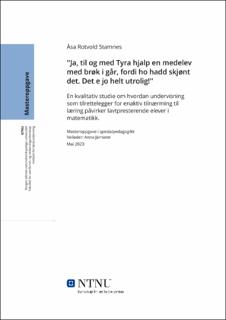''Ja, til og med Tyra hjalp en medelev med brøk i går, fordi ho hadd skjønt det. Det e jo helt utrolig!''
Master thesis
Date
2023Metadata
Show full item recordCollections
- Institutt for lærerutdanning [3724]
Abstract
Temaet i denne masteroppgaven er matematikkvansker. Forskning viser at omtrent 15-20% av alle elever har vansker med matematikk, hvorav 5-7% har utviklingsmessig dyskalkuli og 10-15% er lavtpresterende (Mononen, 2017). Formålet med oppgaven er å undersøke hvordan undervisning som tilrettelegger for enaktiv tilnærming til læring påvirker den matematiske kompetansen hos lavtpresterende elever i matematikk. Enaktiv tilnærming til læring handler om den gjensidige påvirkningen mellom prosessene i hjernen, kroppen og omverden (Fredens, 2019; Thompson, 2007), og hvordan disse prosessene sammen påvirker individets læring. Jeg undersøker også undervisningens virkning på årsaksforklaringer til matematikkvansker, og hvordan undervisningen kan forebygge matematikkvansker som en del av tilpasset opplæring og dermed være et supplement til spesialundervisningen.
Problemstillingen for oppgaven er ‘’Hvordan påvirkes den matematiske kompetansen hos lavtpresterende elever igjennom enaktiv tilnærming til læring?’’, med følgende tre forskningsspørsmål; ‘’Hvordan påvirkes Kilpatrick, Swafford & Findell (2001) sine komponenter i matematisk kompetanse gjennom enaktiv tilnærming til læring?’’, ‘’På hvilke måter påvirker undervisningen Engström (2000) sine årsaksforklaringer for matematikkvansker?’’ og ‘’Hvordan åpner undervisningen for tilrettelagt opplæring i ordinær undervisning?’’.
For å finne svar på oppgavens problemstilling og forskerspørsmål på en hensiktsmessig måte bruker jeg kvalitativ metode, ved å observere og intervjue fire lavtpresterende elever og deres faglærer i matematikk. Deretter anvender jeg deduktiv tematisk analyse, for analyse og presentasjon av funn. Drøftingen av funnene indikerer at undervisning som tilrettelegger for enaktiv tilnærming til læring styrker den lavtpresterende elevens matematiske kompetanse. Funnene antyder at undervisningen har en positiv virkning på årsaksforklaringene til matematikkvansker, og dermed kan fungere som både tilpasset opplæring i ordinær undervisning og som et supplement til spesialundervisningen. The topic of this master thesis is mathematical difficulties. Research shows that approximately 15-20% of all pupils have difficulties with mathematics, of which 5-7% have developmental dyscalculia and 10-15% are low achievers (Mononen, 2017). The purpose of this master thesis is to research how teaching that facilitates an enactive approach to learning affects the mathematical competence of low-achieving students in mathematics. An enactive approach to learning is about the mutual influence between the processes in the brain, the body, and the outside world (Fredens, 2019; Thompson, 2007), and how these processes together have an influence on the individual's learning. I am also researching how the teaching might have an impact on Engström’s (2000) categorization of the causes for mathematical difficulties, and how the teaching can prevent mathematics difficulties as part of adapted education and thus be a supplement in special education.
The issue for the thesis is researching ''How is the mathematical competence of low-achieving students affected through an enactive approach to learning?'', with the following three research questions; ''How are Kilpatrick, Swafford & Findell's (2001) components of mathematical competence affected through an enactive approach to learning?'', ''In what ways does the teaching affect Engström’s (2000) categorization of the causes for difficulties in mathematics?'' and ''How does the teaching open up for adapted education?''.
In order to find answers to these questions in a practical way, I use a qualitative method, by observing and interviewing four students that are low-achieving and their teacher in mathematics. I then use deductive thematic analysis, to both analyse and present the findings. The discussion of the findings indicates that teaching that facilitates an enactive approach to learning strengthens the low-achieving student's mathematical competence. The findings suggest that the teaching has a positive effect on the chosen classification of the causes for mathematics difficulties, and can function both as adapted education and as a supplement in special education.
